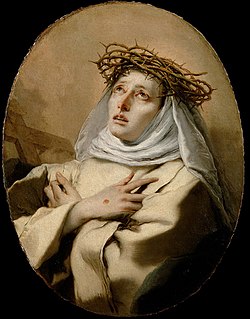
Catherine of Siena , a lay member of the Dominican Order, was a mystic, activist, and author who had a great influence on Italian literature and on the Catholic Church. Canonized in 1461, she is also a Doctor of the Church.
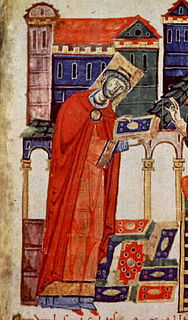
Pope Victor III, born Dauferio, was the head of the Catholic Church and ruler of the Papal States from 24 May 1086 to his death. He was the successor of Pope Gregory VII, yet his pontificate is far less notable than his time as Desiderius, the great abbot of Montecassino.
Pope John XII, born Octavian, was the bishop of Rome and ruler of the Papal States from 16 December 955 to his death in 964. He was related to the counts of Tusculum, a powerful Roman family which had dominated papal politics for over half a century. He became pope in his late teenage years or early twenties. In 960, he clashed with the Lombards to the south. Unable to control Rome easily, he sought help from King Otto I of Germany and crowned him emperor. John XII's pontificate became infamous for the alleged depravity and worldliness with which he conducted his office. He soon fell out with Otto, but died before Otto succeeded in his attempt to depose him.

The 1878 papal conclave, which resulted from the death of Pope Pius IX on 7 February 1878, met from 18 to 20 February. The conclave followed the longest reign of any other pope since Saint Peter. It was the first election of a pope who would not rule the Papal States. It was the first to meet in the Apostolic Palace in the Vatican because the venue used earlier in the 19th century, the Quirinal Palace, was now the palace of the King of Italy, Umberto I.
Landulf IV was the prince of Capua and Benevento from 968, when he was associated with his father, Pandulf Ironhead, and prince of Salerno associated with his father from 977 or 978. In 968, his uncle Landulf III died and this was the occasion of his rise, as Pandulf ignored the rights of Landulf's son Pandulf, his nephew, and instead associated his own son with the government.
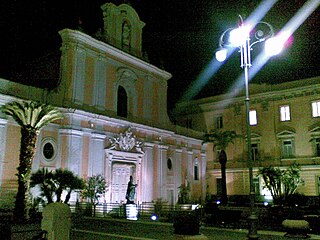
Santa Maria Capua Vetere is a town and comune in the province of Caserta, part of the region of Campania.

Nikolaus von Schönberg was a German Archbishop of Capua.
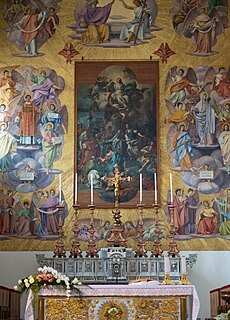
The Roman Catholic Archdiocese of Capua is an archdiocese of the Roman Catholic Church in Capua, in Campania, Italy, but its archbishop no longer holds metropolitan rank and has no ecclesiastical province. Since 1979, it is a suffragan of the Archdiocese of Napoli, i.e. no longer has its own ecclesiastical province nor metropolitan status.
Ptolemy I was the count of Tusculum in the first quarter of the twelfth century. He was a son of Gregory III. Peter Pisanus, in his Vita Paschalis II refers to Ptolemy and the abbot of Farfa as the allies of the emperor in the same way that the Saints Peter and Paul were the allies of the pope.
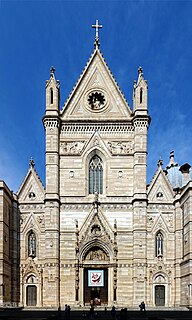
The Roman Catholic Archdiocese of Naples is a Roman Catholic Archdiocese in southern Italy, the see being in Naples. A Christian community was founded there in the 1st century AD and the diocese of Naples was raised to the level of an Archdiocese in the 10th century. Two Archbishops of Naples have been elected Pope, Paul IV and Innocent XII.

Peter of Capua was an Italian scholastic theologian and prelate. He served as cardinal-deacon of Santa Maria in Via Lata from 1193 until 1201 and cardinal-priest of San Marcello al Corso from 1201 until his death. He often worked as a papal legate. He wrote several theological works and was a patron of his hometown of Amalfi.
John Halgren of Abbeville was a French scholastic theologian and cleric. He served successively as a university professor, priest, prior, archbishop, cardinal, apostolic legate and diplomat.

The 1086 papal election ended with the election of Desiderius, abbot of Monte Cassino as Pope Gregory VII's successor after a year-long period of sede vacante.
Juan López was a Spanish Roman Catholic bishop and cardinal.

Francesco Gonzaga was an Italian nobleman, who was Duke of Ariano. He was also a Roman Catholic cardinal and bishop.

Giovanni Vincenzo Gonzaga (1540–1591) was an Italian Roman Catholic cardinal.

Innico Caracciolo di Martina or Innico Caracciolo the Younger was an Italian cardinal.

Thomas of Capua, also called Tommaso di Eboli, was an Italian prelate and diplomat. He served as the archbishop-elect of Naples from 1215 until 1216 and then as a cardinal until his death. He administered the diocese of Albano between 1218 and 1222 and was the papal legate in the kingdom of Italy from November 1236 until October 1237. He was the most important of Pope Gregory IX's negotiators with the Emperor Frederick II between 1227 and 1237.
Peter of Capua, known in Italian as Pietro Capuano, was an Italian theologian and clergyman who taught at the University of Paris from 1206 to 1218, was briefly patriarchate-designate of Antioch in 1219 and was then cardinal-deacon of San Giorgio in Velabro from 1219 until his death. The scion of an illustrious family from the Kingdom of Sicily and educated at Paris, he became known in Rome as a friend of the French church and of the Holy Roman Emperor.











